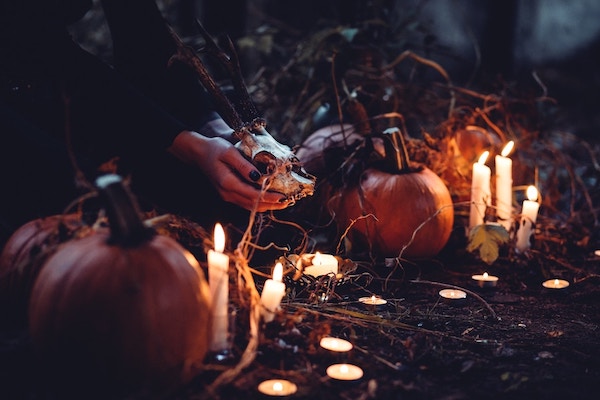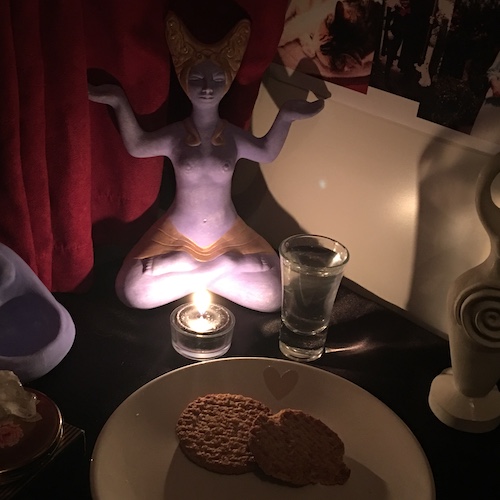Today, I want to talk about Ancestors.
Given Samhain approaches, and the Veil between the worlds of the living and the dead are traditionally considered thinner at this time of year, it seems appropriate to talk about this today. As I’ve said before, Witchery is both a craft and a spiritual pathway for me. In my practice, I connect with a few deities — more on Them another time — and also my Ancestors. These Ancestors may be of blood, or they may be
chosen family, or they may be from my spiritual lineages.

Who are the Ancestors?
At a very basic level, our Ancestors are family members who have passed on and await us beyond the Veil. How I’m going to describe them next probably varies from witch to witch, so remember that this is just my own understanding, interpretation, and experience of them. In my mind, the concept of Ancestors works like a set of concentric rings, with myself in the centre. So, working outwards…
Closest to us are the family we knew and loved on the physical — so perhaps a grandparent, parent, sibling, or child. We may have photographs of them and memories of them to draw upon to help infuse our practice with a more intimate energy than we would if we were working with family members with whom we are less familiar. This is the next “ring” of Ancestors if you like, those who are connected to us by blood but with whom we had no physical contact — so maybe a great-great-grandparent, or an uncle who died during a war. We may sometimes have photographs of them, maybe some historical data like familial diaries that have been passed down or even a genealogical tree to aid us. These are members of our Ancestors who we can name but perhaps go no further than that.
Now, in some rituals and honouring rites I’ve done in the past (and will no doubt do again), it’s very powerful to call in these Ancestors, whether I knew them or not. For instance, you may call in your motherline by naming yourself, then “daughter of (your mother’s name), daughter of (your grandmother’s name)…” and so on, as far back as you can go. You may do the same for your fatherline. You may choose to call in a group of Ancestors by name who are all of the same generation (e.g. all your aunts and uncles from one branch of your family) or just all your grandparents. It really depends on the reason why you’re calling upon them. I’ll get to this in a minute.
Going back to the rings, and working ever outwards, the next ring would therefore be familial members who we know nothing about — generations and generations back, beyond that which is recorded. And so calling upon these Ancestors is a bit difficult, but I can still honour and appreciate their role in my existence, with the appropriate reverence and thanks.
Now, as is said in Supernatural, “Family don’t end with blood.” This is true, to me, of ancestral work as well. So other Ancestors may include dear friends, past furkids, and those with whom I share a spiritual or emotional lineage.
What about Toxic Ancestors?
Something I don’t see discussed often in witchy circles is the concept of toxic Ancestors. By this I mean those people who, when they were on the physical, were toxic to either yourself or those around them. I’m not going to go into detail about what this could mean; I’ll leave that for you to infer. But when we have toxic family members among our Ancestors, it can make any form of ancestral working very triggering to the practitioner. And this absolutely needs to be understood and held with gentleness. Our magic is there to nourish and fulfil us, not trigger us. And the same is true for our ancestral work.
We do not need to engage with or show reverence for a Toxic Ancestor. Not now, not ever. Regardless of how we may or may not have felt obligated to relate or interact with them if/when they were on the physical, that obligation does not carry over to the non-physical. Therefore it can be immensely helpful to call upon our Healthy Ancestors, and be specific by using that statement, rather than unintentionally calling on those who did not — and still do not — have our best interests at heart.
What about the Beloved Dead and Mighty Dead?
These are two terms used a lot in various branches of Paganism, and the way I view these are ways of labelling distinct branches of our Ancestors. For me, my Beloved Dead are all the Ancestors, blood and non-blood, who are my Chosen Family. They include a parent, grandparents, great-grandparents, friends, and furkids.
I interpret the Mighty Dead as those of my spiritual pathway who have gone on before me — those who I consider to be elders, teachers, authors, and the like who have had a direct impact on who I am and what I practice. They include both Witches and non-Witches. They include people I knew and people I don’t know, and people who died long before I was born.
Note that I haven’t included deities in any of this. Some Witches do count deities as being members of their Ancestors. Personally, I do not. I view my Ancestors, Beloved Dead, and Mighty Dead as spirits who have gone on before me. My deities are Divine forms who are separate to spirits, yet there may be some overlap in how I communicate with both groups.
How this works in my practice
 Honouring the Ancestors does not have to be challenging or flamboyant. As with much of the spiritual/magical life, it can have as many bells and whistles as you like.
Honouring the Ancestors does not have to be challenging or flamboyant. As with much of the spiritual/magical life, it can have as many bells and whistles as you like.
My ancestral practice is, at present, very simple. I set up an altar (black altar cloth, one tealight candle) and added photos of my Beloved Dead. I have very few physical photos, so I created a photo collage in a graphics program and printed it off; I then stuck that to the wall over the altar. I have a plate and small glass on there, too.
Every day, I pour a fresh drink — usually water, sometimes something stronger — and add a portion of my meal to the plate. I work from home, so I’ve taken to sitting at the altar at lunchtimes, sharing my lunch with my Beloved Dead. If it’s someone’s anniversary or birthday, I’ll try and plan ahead of time and offer a favourite food/drink.
I always, always add blessings and thanks over the food/drink — both when I’m sharing it and when I’m removing it. Again, this can be as simple or complex as you want/need.
Sometimes I’ll burn incense too — usually something like sandalwood or patchouli, deep and earthy, but sometimes something more appropriate to a particular member of my family; it all depends on who I’m resonating with at the time.
And then I just … chat. I talk about what’s going on with me, where I’m at, what I may need help with. I talk through my worries and wishes. I share my memories of them. I ask what they need, what I can do to be a good descendant. I listen — a lot. This is very important: Listening, and feeling into the bodily sensations I may experience. I sit in silence with them. Sometimes I’ll play a particular song, but usually I just have the pull to sit in silence. I often journal after lunch, before I leave the altar space.
If it’s a day where having lunch with them would be difficult, I try to do the same thing with breakfast or a snack. If not, I’ll make sure I spend time with them before bed, and offer something for supper instead.
I tend to replace the food/drink every day. I pour the water onto the garden/into a plant pot, and compost the food waste. All done with respect, of course.
Sometimes I’ll take a card deck to the altar too, and ask for their assistance with something, then throw the cards. I may decide to work a ritual or spell in the presence of selected Ancestors, and if that’s the case I customise my offerings (and timing!) to be more relevant to the Ancestors with whom I’m working and/or appropriate to the magical working. But usually it’s just sit, eat, natter, listen. Be reverent, respectful, loving, grateful. Wash, rinse, repeat.
Family don’t end with blood. It don’t end with physical death, either. Who is remembered, lives.
Photo Credits:
Witchy ritual photo by freestocks.org on Unsplash
Ancestral altar photo by Heathwitch, October 2019.


